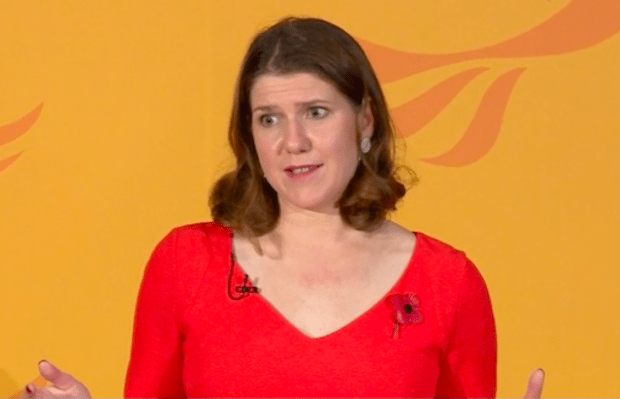The Liberal Democrat election campaign launch was beset by technical difficulties which meant that Jo Swinson was at times hard to make out. However, the anti-Brexit message was loud and clear. The enthusiastic Liberal Democrat leader said she was ‘excited’ to stand as the Liberal Democrat candidate for Prime Minister. Swinson said there was a very real chance she could be the next inhabitant of 10 Downing Street as it was not about ‘the red team or the blue team anymore’.
Swinson was clear that only her party could be trusted to stop Brexit. She pitched the Liberal Democrats as the party of the centre ground – stuck between two extremes in Labour and the Tories. But she had a harder time when it came to the Q and A.
Asked why Swinson was standing a candidate in the Tory/Labour marginal seat of Canterbury when the incumbent MP Rosie Duffield supports a People’s Vote, Swinson appeared uncomfortable. Swinson went on to say that for all her personal like of Duffield, Duffield was Labour – a party that is not unashamedly pro-Remain. She suggested that Duffield would be welcome to join the Liberal Democrats.
For all the previous talk of electoral pacts between the Liberal Democrats and Labour to keep the Tories at bay, there was little sign of goodwill from Swinson towards Corbyn. Discussing the prospect of a Jeremy Corbyn premiership, Swinson said she was ‘absolutely, categorically’ ruling out using Lib Dem votes to put Corbyn into No 10. She pointed to Corbyn’s failure to crack down on anti-Semitism as one of several reasons she could not work with him.
In some ways this is unsurprising. The Liberal Democrats hope to pitch themselves as the acceptable choice for those voters who are disillusioned with Labour’s lurch to the Left. To suggest that the Liberal Democrats would support a Labour government would be to defeat the point of them – why vote Liberal Democrat to get Labour?
However, for all of Swinson’s criticism of Labour, few (including those activists at the launch) really believe that Swinson is on course for a majority. If the Liberal Democrats end up winning enough seats that Labour needs their support to form a functioning government, it would be an odd look for Swinson to refuse the clearest route to a second EU referendum. Her critics have already said this would be tantamount to supporting the Tory party – something she has also said she won’t do.
In such a scenario, it’s likely the Liberal Democrats would attempt to put pressure on Labour to change leader. If that failed, Swinson would face a difficult choice of her own. With Labour ahead in the polls, Swinson is facing a third party squeeze. Unless this changers, her Corbyn problem will define the Liberal Democrat campaign.







Comments